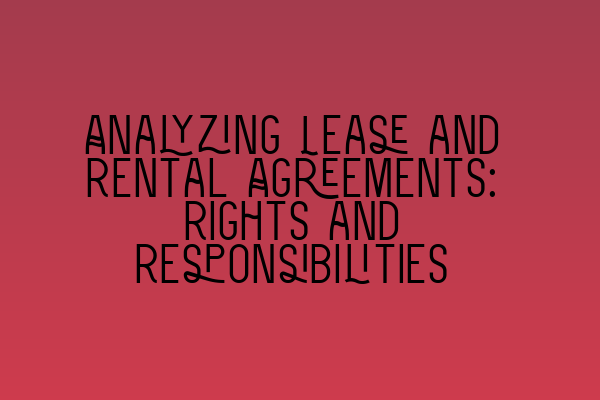Analyzing Lease and Rental Agreements: Rights and Responsibilities
When it comes to lease and rental agreements, both parties involved need to fully understand their rights and responsibilities. Whether you are a landlord drafting a lease agreement or a tenant signing one, it is crucial to be aware of the legal implications and obligations that come with such agreements. In this article, we will analyze lease and rental agreements, focusing on the rights and responsibilities of both landlords and tenants. Let’s dive in!
Understanding Lease and Rental Agreements
Lease and rental agreements are legally binding contracts that outline the terms and conditions between the landlord and the tenant. These agreements set forth the rights and responsibilities of both parties, including important details such as the duration of the lease, rent payments, maintenance responsibilities, and other provisions.
Rights and Responsibilities of Landlords
As a landlord, it is essential to understand your rights and responsibilities in order to ensure a smooth landlord-tenant relationship. Some important rights and responsibilities include:
1. Right to collect rent: As a landlord, you have the right to collect rent from the tenant. It is your responsibility to clearly state the amount of rent, the due date, and any penalties for late payments in the lease agreement.
2. Right to a security deposit: Landlords have the right to request a security deposit from tenants to cover any damages beyond normal wear and tear. However, there are legal restrictions regarding the amount that can be charged and how it should be handled.
3. Responsibility to maintain the property: It is the landlord’s responsibility to keep the rental property in a habitable condition. This includes addressing any necessary repairs, ensuring the property meets health and safety requirements, and providing essential services such as water and heat.
4. Right to enter the property: Landlords have the right to enter the rental property for certain reasons, such as making repairs, conducting inspections, or showing the property to potential tenants. However, proper notice must be given to the tenant in accordance with local laws.
For a comprehensive comparison between a barrister and a solicitor, you can refer to our article on Barrister vs. Solicitor: A Comprehensive Comparison.
Rights and Responsibilities of Tenants
Tenants also have rights and responsibilities that they need to be aware of. Here are some key points for tenants:
1. Right to quiet enjoyment: Tenants have the right to “quiet enjoyment” of the property, which means they can live in the property without interference from the landlord. This includes the right to be free from harassment or unlawful eviction.
2. Responsibility to pay rent: It is the tenant’s responsibility to pay rent in a timely manner as specified in the lease agreement. Failure to do so may result in penalties or eviction.
3. Responsibility to maintain the property: While the landlord is responsible for major repairs and maintenance, tenants are generally responsible for keeping the property clean and reporting any damages or maintenance issues promptly.
If you are interested in exploring different solicitor specializations and finding your niche, we recommend reading our article on Exploring Different Solicitor Specializations: Finding Your Niche.
Resolving Disputes
Despite best intentions, disputes can arise between landlords and tenants. In the event of a conflict, it is advisable to resolve the issue through communication and negotiation first. If attempts at resolution fail, legal action may be necessary. However, it is important to consult with a solicitor who specializes in contract law to understand the legal options available to you.
Final Thoughts
Analyzing lease and rental agreements is crucial for both landlords and tenants to ensure a fair and lawful tenancy. By understanding the rights and responsibilities outlined in the contract, both parties can avoid misunderstandings and potential legal issues. If you have further questions or need legal advice concerning lease and rental agreements, don’t hesitate to contact SQE Contract Law for expert guidance.
To learn more about the rise of virtual law practices, you can read our article on Embracing the Rise of Virtual Law Practices. Additionally, if you are interested in real-life case studies and insights into legal practice and decision-making, our article on Unveiling Real-Life Case Studies: Insights into Legal Practice and Decision-Making can provide valuable information. Lastly, for an exploration of solicitor salaries in the UK and the factors affecting income, we invite you to read our article on Exploring Solicitor Salaries in the UK: Average Earnings and Factors Affecting Income.
